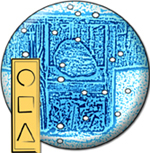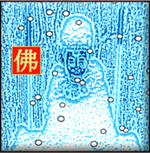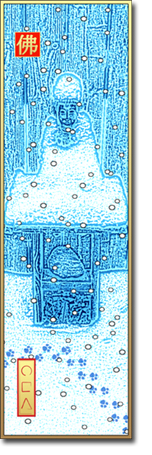On The Way: The Daily Zen Journal
Discourses of Master Po Shan part 2
Po Shan (1575-1630)

In ancient times people could enter Dhyana while tilling the land, picking peaches or doing anything. It was never a matter of sitting idly for prolonged periods, engaged in forcefully suppressing one’s thoughts. Does Dhyana mean stopping one’s thoughts? If so, this is a debased Dhyana, not the Dhyana of Zen.
When working at Zen, the most harmful thing is to rationalize, conceptualize, or intellectualize the Tao with one’s mind. One who does so will never reach Tao.
When working at Zen, one knows not whether they are walking or sitting. Nothing is present in the mind but the hua tou. Before breaking through the doubt-mass, one loses all sensation of body or mind, let alone such states as walking or sitting.
When working at Zen, one should not just await the coming of enlightenment with an expectant mind. This is like a traveler who sits idly by the road and expects his home to come to him. One will never arrive home this way. One must walk to get there.
Likewise, when working at Zen, one never reaches enlightenment merely by waiting for it. One must press forward with all one’s mind to get this enlightenment.

Attainment of the great enlightenment is like the sudden blossoming of the lotus flower or the sudden awakening of a dreamer. One cannot by waiting awaken from a dream, but one does so automatically when the time for sleep is over. Flowers cannot bloom by waiting, but blossom of themselves when the time has come.
Likewise enlightenment is not so attained, but comes on its own when conditions are ripe. In other words, one should exert all one’s strength to penetrate into the hua tou, pressing one’s mind to the utmost in order to achieve realization.
Do not misunderstand what I have said and just wait for awakening to come. In the moment of awakening, the clouds vanish and the clear sky shines vast and empty; nothing can obscure it. In this moment heaven spins, and the earth somersaults. An entirely different realm appears.
The masters of old said: “Tao, like the great Void, is all-inclusive. It lacks nothing and nothing remains in it.”
One who has really attained the state of flexible hollowness sees no world without and no body or mind within. Only then can one be considered as having drawn near the entrance of Tao.

When working at Zen, one should know these four important points:
- To work on it with absolute detachment and complete freedom in a painstaking, direct, continuous, and flexible-hollow way.
- Without directness exertion is completely wasted; and without exertion, directness is useless because it alone can never bring one to the entrance of Tao.
- Once the entrance is reached, however, one should maintain an uninterrupted continuity in order to attain a state conforming with enlightenment.
- Once this state is achieved, one should strive to be flexible-hollow. Only then can one reach the state of wonder.

Po Shan (1575-1630)
Notes from the translator for this reading:
“Hua tou” (means “the essence of the sentence”). Although both koan and hua tou may be used to denote the “inquiry exercise of Zen,” the latter is original and more accurate.
“Koan” implies the entire Zen story, including all the events, plus the main question at issue, and therefore is a general term, while “hua tou” is very specific.
Hua tou denotes only the question, not the whole story, and in most cases only the gist, highlight, or essence, so to speak, of the question is implied. Hua tou also means before a word or thought and the ends or edges of a sentence.
excerpted from The Practice of Zen – Chang Chen-chi 1959 out of print





“When working at Zen” – Po Shan gives us a few guidelines to help steer this wandering path we are on. For those who have never been given a koan or hua tou to investigate, how do you proceed?
It can never be enough to read the stories about the encounters of Zen masters and their students or to take one of the well know koans in the collections and take it for oneself. These reflect spontaneous encounters that are for us now just stories of someone else’s adventure.
The other way the adventure gets muddied is all the enlightenment stories which, once again, are someone else’s attempt to describe something indescribable. Best to let all of them wash through us and let them go.
Life itself presents its own koans to us if we are examining closely. It may appear as a question you just can’t answer or solve, and like koan practice you keep returning to this riddle for years. Instead of a teacher assigning you a koan, Life brings its own mystery to solve.
Another approach expressed in Dogen’s Genjokoan offers a different perspective:
To learn the Buddhist Way is to learn about oneself. To learn about oneself is to forget oneself. To forget oneself is to perceive oneself as all things. To realize this is to cast off the body and mind of self and others. When you have reached this stage you will be detached even from enlightenment but will practice it continually without thinking about it.
Dogen – written in mid-autumn 1233
Resting in the lap of the Universe, how are you expressing the present unfolding?
Yours along the Way,
Elana, Scribe for Daily Zen